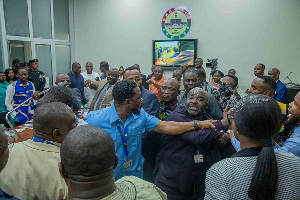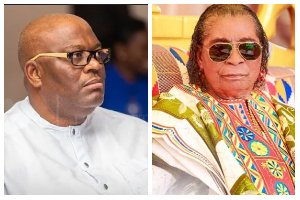
Parliamentary chaos
Ghana’s Parliament has once again been thrown into chaos as the vetting process for President John Dramani Mahama’s nominees, including Okudzeto Ablakwa and Kwabena Mintah Akandoh, descended into disorder. The recent session was marked by heated exchanges and accusations, signaling ongoing tensions between the Majority and Minority parties.
The trouble began when Minority Leader Alexander Kwamina Afenyo-Markin led his colleagues into the House. Upon arrival, he immediately directed sharp criticisms at the Clerk of the Appointments Committee, accusing her of political bias favoring the National Democratic Congress (NDC). This accusation set the stage for further unrest.
Frank Annoh-Dompreh, the Minority Chief Whip, expressed frustration over the handling of the vetting process. In an interview, he recounted that his party had been in a caucus meeting when the vetting began without their agreement. He argued that this was a display of bad faith, saying, “You could have just waited for an hour; we will come and agree on what to do.”
Despite the turmoil, Afenyo-Markin reassured everyone of the Minority’s commitment to the vetting process. He stated, “We want to assure the Ghanaian people that our side does not seek to obstruct government business.” His words aimed to convey cooperation, despite the evident discord.
The night before, the chaos escalated during the vetting of Minister of Foreign Affairs-designate, Samuel Okudzeto Ablakwa. The Appointments Committee had initially agreed to vet only four nominees, but by that time, five had already been processed, with two more proposed for inclusion. This deviation from the agreed plan incited anger, leading to physical altercations that resulted in damaged equipment and overturned tables.
Frank Annoh-Dompreh reiterated the importance of adhering to agreements, stating, “We agreed on four; we have done five.” His remarks highlight the need for order and respect within the parliamentary procedure.
As the situation in Parliament continues to unfold, it raises questions about governance and cooperation among lawmakers. The chaotic scenes reflect deeper issues within the political landscape and pose challenges for the effectiveness of the legislative process.






